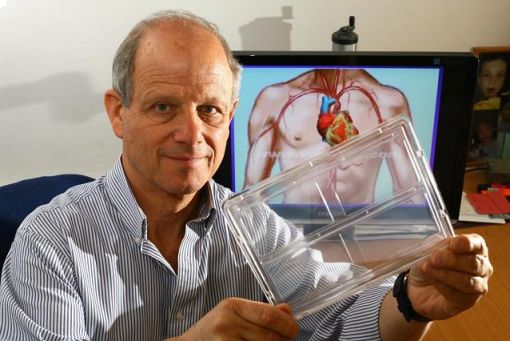Prof. Daniel Cohen from the Institute of Chemistry at the Hebrew University has developed a unique type of polymer (a substance created by connecting smaller molecules) that creates a partition between layers of dissected tissues and prevents adhesion of tissue surfaces that come in contact with each other.

A substance developed at the Hebrew University of Jerusalem to prevent tissue adhesions after surgery has been approved for use by the American Food and Drug Administration (FDA) for heart surgery patients up to the age of 21.
Prof. Daniel Cohen from the Institute of Chemistry at the Hebrew University has developed a unique type of polymer (a substance created by connecting smaller molecules) that creates a partition between layers of dissected tissues and prevents adhesion of tissue surfaces that come in contact with each other.
SyntheMed Inc. of Iselin from New Jersey, which acquired a license to use the material from the Hebrew University Research Development Company, received FDA approval for the first product REPEL-CV®. This product is intended for use in heart surgery patients up to the age of 21 who are likely to need another open heart surgery.
The formation of adhesions due to heart surgery requires special attention due to their ability to affect heart function. Often, when repeated heart surgery is required, the adhesions hide important areas of the heart and may cause damage to blood vessels or the heart, thereby endangering the life of the patient.
In the US, there are 350 to 400 children with a congenital heart defect. Many patients, newborns and small children, have to undergo multiple surgeries to correct the defect, while other children need additional surgeries as they grow. REPEL-CV® gives doctors another tool to reduce the complications that can happen during these surgeries.
"I am very excited that a long process - which began a few years ago in our laboratory at the Institute of Chemistry at the Hebrew University in the design and synthesis of the family of biodegradable polymers - was recently approved by the FDA," Prof. Cohen said today.
"This biomedical product harnesses the special properties of the family of biodegradable polymers to treat a wide variety of medical problems that occur in all types of surgery and originate from tissue adhesion after surgery. Every operation is accompanied by inevitable results of post-operative infection. The material we developed at the Hebrew University allows us to reduce these infections."
The FDA approval was given after the product was approved in Europe and Canada. Obtaining the approval of various regulatory agencies was the work of a large team. It started with the research conducted by Prof. Cohen and his group and continued with the research done at SyntheMed Inc. who developed the product up to the clinical stage.
"I would like to thank everyone who contributed to the success of this project along the way," said Prof. Cohen.
Last year, for his research in the field of polymers, Prof. Cohen received the Kay First Prize for Innovative Developments, a prize awarded each year to encourage faculty members and students at the university to develop innovative coatings with commercial potential that will benefit science and society.
